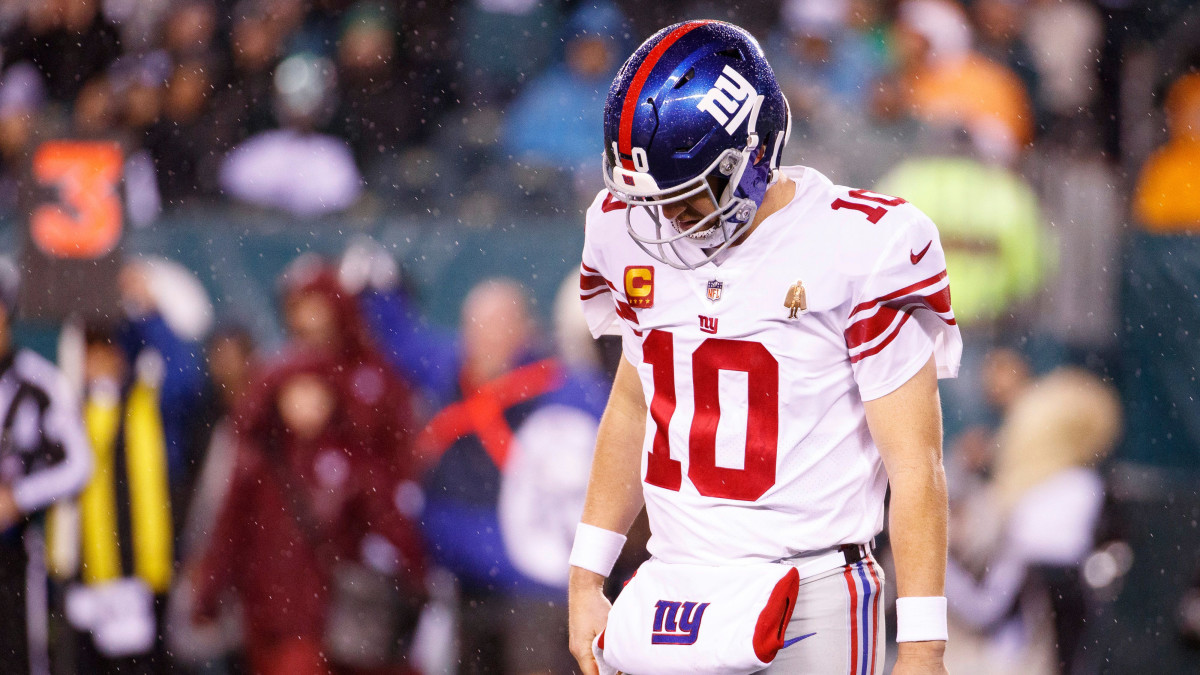Regardless of Who's at Quarterback, the Giants are Hopelessly Adrift


The moment we all waited for lasted about 20 seconds.
Eagles-Giants had all the aesthetic appeal of an ice cream cone melting upside down in the beach sand. Philadelphia was out of wide receivers (literally, with one healthy body remaining on the depth chart). New York, despite being one of the first teams mathematically eliminated from the playoffs, approached the game with the aggressiveness of a geriatric hobby golfer.
And yet here was Eli Manning licking the palms of both of his hands, digging in from his own 25-yard line for what could have been his 38th career fourth-quarter comeback in a 17-17 game against his longtime division rivals. There was 1:53 on the clock. A loss would seriously doom the Eagles’ hope of returning to the playoffs.
The NFL was fortunate for this development, that, for some reason we’ll torture ourselves late into the night for a whiff of compelling narrative. Here was a potential moment of relevance for a team that had fallen out of our consciousness months ago. Here was a chance for the quarterback to at least partially exorcize the emotional heaviness of a season that saw him pass the job onto someone younger. Here was a chance for Manning to glide into the offseason as a quarterback with options; a veteran that people may now think was beaten down by years of horrendous coaching who was ultimately scapegoated by the franchise.
Instead, what we got was a short completion to the right side on first down and two straight incompletions after that. Oh, and of course a punt. The Eagles played for overtime, won the toss, ran the ball straight down the throat of the Giants’ defense and watched as Carson Wentz flicked a game-winning score to Zach Ertz.
Over the course of the entire second half, Manning was 4-of-11 for 24 yards. The Giants ran 20 plays in the half and gained 30 total yards.
Early on, before the Eagles scored 20 unanswered points, it seemed like we were headed for a Manning renaissance. He threw a pair of touchdown passes to Darius Slayton, humming along in the unique, swaggerless fashion that had endeared himself to a fanbase for the better part of two decades. But after a few minutes in the second half, it became obvious that this was just another Giants game that had nothing to do with who was under center.
It wasn’t about Manning as much as it was a snapshot of a franchise continuing to float adrift. In our collective effort to remember what Manning was like at his best, the game was simply a reminder of what the Giants have done as an organization to sink them to this point: Coaching staffs unable to make halftime adjustments. Weapons rendered useless. A roster alarmingly hollow despite significant expenditures in free agency. None of which, by the way, can or should be placed on the shoulders of a quarterback performing mop-up duty at the end of a long season.
In a way, trotting out Manning may have been healthy for the Giants themselves, so that they could see, in general, that the key to their future doesn’t lie in their past. They are a franchise obsessed with recreating their successes from a blueprint instead of evolving with the rest of the NFL. Unfortunately, all ideas and philosophies have an expiration date.
Manning did his best to make us feel for a second that it wasn’t true. For most of the game, he defied the circumstances dragging this roster down. But by the time the moment we were all waiting for came, the Giants had already lost. No amount of familiar magic was altering the inevitable, already in motion.
